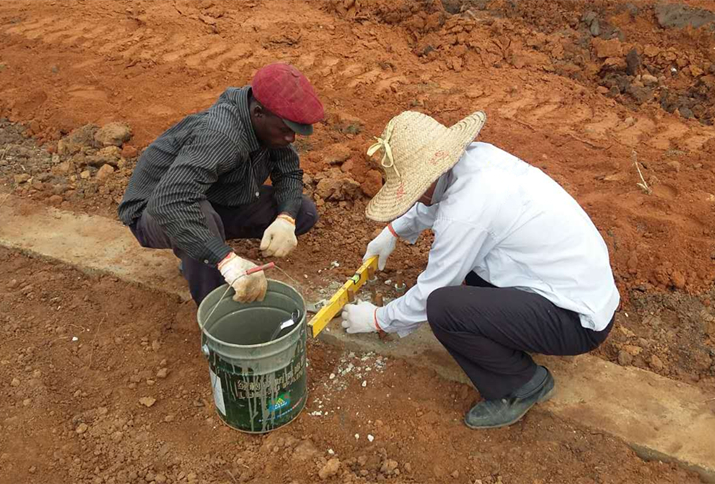|
|||||||||||
|
|
| Giving Trade Wings |
| Free trade zones are a win-win program for both China and Africa |
| By Xia Yuanyuan | VOL. 8 February 2016 |
 |
| Africans in the Ogun-Guangdong Free Trade Zone |
The Ogun-Guangdong Free Trade Zone (FTZ) was launched in Igvessa, a region in southwest Nigeria’s Ogun State, in 2008. It is one of the first eight Chinese overseas economic and trade cooperation zones established in Africa.
Taking the first step proverbially costs the most. The development of the FTZ didn’t go smoothly in the early stage. It was faced with several problems, including weak infrastructure, shortage of workers, the harsh climate and epidemics. In addition, in 2012 the FTZ was shut down by the local customs authorities after an enterprise was found engaged in smuggling.
In July 2012, Han Jianxin, currently Managing Director of the zone, was entrusted with the mission to save it. "It was definitely very stressful but I was determined," Han told ChinAfrica .
Han arrived in Ogun in October 2012 after flying for over 10 hours. The FTZ was nearly paralyzed. It had stopped trading for nearly half a year and only two enterprises were still there. Han’s first job was to re-organize the management team and liaison with customs officials.
The major problems were resolved with the establishment of clear production rules, which said the enterprises based in the FTZ would have to obey local laws and regulations. Subsequently, the FTZ was revived and started 24-hour nonstop production and shipments from January 2013.
As of September 30, 2015, 48 enterprises were operating in it with the cumulative investment amounting to $226.55 million.
Business advantages
Han can’t conceal his pride. "Every day, more than 2,000 trucks go in and out of the FTZ. All the enterprises are going full steam ahead," he said with satisfaction.
The industries operating in the FTZ are mostly in the fields of building material, packaging, chemicals, household appliances, furniture and machinery.
Goodwill Ceramic, the largest enterprise in the FTZ, arrived in December 2011. It started trade from January 2013. "Compared to investing solo in Nigeria, there are a lot of advantages in operating from the FTZ," said Chen Wuyi, Goodwill’s General Manager. "The Ogun-Guangdong FTZ is an ideal place where goods can be received, handled, manufactured or reconfigured."
The FTZ has several geographical advantages. It is only 30 km from both Apapa Port and the Murtala Muhammed International Airport in Lagos. It has first-class infrastructure. In addition, it offers incentives such as elimination of value-added tax, preferential customs tariff policies and favorable policies vis-a-vis corporate and personal income tax. "We are committed to providing a one-stop service for enterprises operating from here," Han said. “The Ogun-Guangdong FTZ is the best choice for Chinese and enterprises worldwide investing in Nigeria."
Reaping benefits
Of the over 4,900 people working in the FTZ, only 202 - about 4 percent - are Chinese; the rest are locals. While the average income of local Nigerians is between 12,000 and 18,000 naira ($76-113) per month, the average income of FTZ employees is about 30,000 naira ($189).
 |
| A Chinese technician offering guidance to a Nigerian worker |
In Han’s spare time, he loves chatting with African workers. Once he asked a worker whether the man was satisfied with his job. The worker told him that during the three years in the FTZ, he had been getting his salary in time every month. For the first time in his life, he could plan things. He even planned a trip for his entire family.
Besides paying $2.6 million in taxes to the local government between January and September 2015, the FTZ has spent $50 million on infrastructure construction. This included building roads, drainage facilities and two cesspools and public facilities. The improved infrastructure has injected new vitality into local industries and boosted economic and social development. Apart from generating jobs and addressing the local unemployment problem, the FTZ also insists on technology transfers. Every enterprise has sent top-notch technicians to train local workers.
Mutual benefit
At the Forum on China-Africa Cooperation Johannesburg Summit in December 2015, the Chinese Government pledged to support African countries to construct more special economic zones and industrial and science parks. The government also said it would encourage Chinese enterprises to construct economic and trade zones in Africa, adhering to the principle of mutual benefit.
“Constructing FTZs in African countries has become a significant developmental model for Chinese enterprises going out," said Justin Yifu Lin, Honorary Dean of the National School of Development, Peking University. "Great efforts should be made to take China’s manufacturing enterprises to African countries, which is beneficial for the latter’s industrialization.
Asked his long-term plan for the Ogun-Guangdong FTZ, Han pondered for a while. "I have a big dream," he smiled. He wants it to cover the entire planned area of 100 square km and attract more than 1,000 enterprises. Han also wants to build a satellite city nearby with sound living facilities for the convenience of the FTZ’s local workers.
|
|||
| Copyright ChinAfrica All right reserved 京ICP备08005356号 |